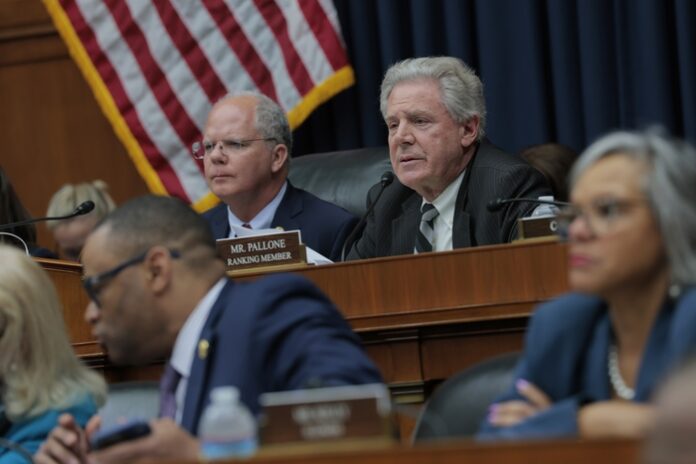
WASHINGTON (States Newsroom) — The U.S. House panel in charge of overhauling Medicaid by cutting hundreds of billions in federal spending wrapped up debate on its bill Wednesday, following a 25-hour session.
The Energy and Commerce Committee voted 30-24 along party lines to sign off on the legislation, sending it to the Budget panel, which is expected to bundle it together with the other 10 measures Friday to create Republicans’ “big, beautiful bill.”
The full House is set to vote on that package next week, though GOP leaders need to make sure nearly all of the chamber’s 220 Republicans support the overall bill in order for it to pass.
The legislation, should it gain that backing, will then head to the Senate, where GOP lawmakers are expected to rewrite or eliminate numerous sections of the bill.
Analysis from the nonpartisan Congressional Budget Office, shared with States Newsroom by Republican staff on the Energy and Commerce Committee, shows the Medicaid changes would cut $625 billion in federal spending during the next decade.
About 10.3 million people would lose access to Medicaid or the Children’s Health Insurance Program, with 7.6 million people becoming uninsured during the 10-year budget window, according to the CBO analysis, which has yet to be released publicly.
House committee debate on the bill, which began Tuesday and continued overnight, largely centered around Democrats saying the legislation would lead millions of vulnerable people to lose access to Medicaid, while Republicans contended their overhaul would protect “the integrity” of the health care program for lower income Americans and some people with disabilities.
Democrats proposed dozens of amendments trying to change the bill’s various sections, including the Medicaid provisions, but Republicans on the committee blocked their adoption.
‘They’re going to lose coverage’
Just after the sun rose over Capitol Hill on Wednesday morning, Ohio Democratic Rep. Greg Landsman said Republican claims about people not being kicked off Medicaid due to federal spending cuts were going “off the rails.”
“They’re going to lose coverage in part because of the red tape and the paperwork. We know that because we’ve seen it in other states,” Landsman said. “And these are people who are eligible or deserving — people who need it.”
Washington Democratic Sen. Kim Schrier later in the day raised concerns that people who lose access to Medicaid would put off getting routine care from primary care doctors, only to end up in emergency departments.
“Those kicked off Medicaid will still get care, of course, but they will be sicker, they’ll be treated in the emergency room, the care will be more complicated, more expensive,” Schrier said. “And since they can’t pay for it, all of us will make up that difference. So our insurance rates will go up.”
Florida Rep. Laurel Lee argued the GOP changes to Medicaid are common sense improvements, like “restoring work requirements for able-bodied adults without dependents, modernizing systems to prevent fraud and abuse, and ending misdirected payments to those who are deceased or who are not eligible for the program.”
“These reforms are not about taking something away; they are about protecting the integrity of the program so that the people we represent — those who truly need this support — can count on it to be there, now and in the future,” Lee said. “Our reforms are about restoring integrity to the system and ensuring that it works for the long haul.”
Attempts to ax work requirement
Democrats proposed numerous amendments during debate on the health care section of the bill, including some that would have eliminated the work requirements.
New Jersey Democratic Rep. Frank Pallone, ranking member on the committee, said those requirements often cause people to lose access to Medicaid due to “red tape” and paperwork.
Pallone said when Georgia implemented work requirements, fewer than 7,000 of the 400,000 people eligible for Medicaid were able to prove to the government they met the standards.
“It’s not that they weren’t eligible, it’s that the state of Georgia put too many barriers in the way of them being able to qualify,” Pallone said. “And that’s what I think is happening here today with this bill.”
He further criticized the GOP for including a provision in the bill saying that if people are not eligible for Medicaid then “they’re not eligible for any kind of subsidy under the Affordable Care Act.”
“So they don’t have that option as well, which is, of course, also the basis for the CBO saying so many people get kicked off Medicaid,” Pallone said. “They assumed that if you didn’t have Medicaid, you would go to the ACA, and that would have probably eliminated most of your savings. But instead, now you say they can’t go to the ACA because they still haven’t filled out the paperwork for Medicaid, so we’re not going to let them go to the ACA and get any kind of subsidized care. And it goes on and on.”
‘We don’t want to repeat the Arkansas law’
Energy and Commerce Chairman Brett Guthrie, R-Ky., said the GOP proposals for work requirements sought to avoid the issues experienced in Arkansas and Georgia, when those states implemented their work requirements for Medicaid.
“We don’t want to repeat the Arkansas law,” Guthrie said. “We agree that was the wrong way to do it.”
Arkansas’ experiment with work requirements and monthly checks was “overly cumbersome,” but Guthrie said this legislation would “only require a beneficiary to have to verify work at the time of enrollment or during a redetermined position of their eligibility. This allows states and beneficiaries to take advantage of existing processing and paperwork that they already go through.”
The GOP bill includes several exceptions to the requirement that people enrolled in Medicaid between the ages of 19 and 65 work, participate in community service, or attend an educational program at least 80 hours a month.
Those exclusions include pregnant people, parents of dependent children, people who have complex medical conditions, tribal community members, people in the foster system, people who were in the foster system who are below the age of 26 and people released from incarceration in the last 90 days, among others.
CBO estimates the work requirements would save the federal government $300 billion during the next decade. That savings wouldn’t begin until after the provision takes effect on Jan. 1, 2029.
GOP lawmakers not on the committee have expressed frustration with the delayed implementation, including South Carolina Republican Rep. Ralph Norman.
“Delaying work requirements for able-bodied adults on Medicaid to 2029 isn’t ‘progress,’” Norman wrote in a social media post. “It’s fiscally irresponsible and another sad excuse for the swamp!!”
Texas Republican Rep. Chip Roy, wrote in a four-page letter, that Congress must “significantly amend” several of the bill’s Medicaid provisions, including immediately implementing the work requirements.
“Republicans are in control now and should not let out-of-year savings be compromised by a future Democratic trifecta,” Roy wrote.
Planned Parenthood debate
Texas Democratic Rep. Lizzie Fletcher sought to remove the provision that would block Medicaid funding from going to Planned Parenthood, though GOP lawmakers ultimately voted to keep the language in the measure.
Federal law for decades has prevented taxpayer dollars from going to abortion services with exceptions for rape, incest, or the life of the pregnant patient. But the provision in the GOP bill would block all Medicaid funding for Planned Parenthood, including for preventive care and regular health check-ups.
Medicaid enrollees who go to Planned Parenthood for wellness checks, birth control, lab work, cancer screenings and other services would have to find a different provider, or go without care.
“To make up the gap, federally qualified health centers would need to increase their capacity by an additional 1 million clients,” Fletcher said. “This is just another way people will lose access to health care. Defunding Planned Parenthood is an assault on the health, dignity and freedom of women across this country.”
Fletcher later pointed out that Planned Parenthood clinics and their affiliates in states with abortion bans would be cut off from federal funding, even though they don’t provide abortions.
She listed the Houston, Texas, Planned Parenthood as one example of a facility that doesn’t perform abortions but would lose federal funding.
The Planned Parenthood language would increase federal deficits by about $300 million during the next decade, according to the Congressional Budget Office. It is the only provision in the health care section of the bill that would not reduce federal spending.
Other organizations said to be affected
Virginia Republican Rep. Morgan Griffith said he was told by CBO that other health organizations in addition to Planned Parenthood would be impacted by the provision, but he was unable to name those health care organizations.
The provision would apply to “providers that are nonprofit organizations, that are essential community providers that are primarily engaged in family planning services or reproductive services, provide for abortions other than for Hyde Amendment exceptions, and which received $1,000,000 or more (to either the provider or the provider’s affiliates) in payments from Medicaid payments in 2024,” according to a summary of the GOP bill. It would take effect as soon as the bill becomes law and last for a decade.
Republican staff on the Energy and Commerce Committee did not immediately respond to a request from States Newsroom for the list that Griffith referenced.
Legal staff said the secretary of Health and Human Services would determine what organizations meet that definition and would therefore lose federal Medicaid funding.
Tennessee Republican Rep. Diana Harshbarger opposed the amendment, saying that it was well past time for Congress to cut off all federal funding for Planned Parenthood.
“This bill does not change the availability of funds for women’s health. It simply establishes a safeguard so that the nation’s largest abortion providers are not the one providing services through Medicaid,” Harshbarger said. “Should these entities stop participating in abortion services, they would again be eligible to receive funding.”
Republicans also blocked an amendment from Illinois Democratic Rep. Robin Kelly that would have required Medicaid to cover a full year of postpartum coverage for enrollees.
The vast majority of states already cover postpartum care for a year under an expansion Democrats approved in the American Rescue Plan, the $1.9 trillion coronavirus relief bill they enacted in 2021. That was later made permanent in a 2022 appropriations law.
But Kelly said she was worried that would change if states had to make tough budget choices due to a drop-off in federal funding for the program.
“Medicaid covers almost half of all births in this country and covers more than half of all births in rural communities,” Kelly said. “When we talk about cutting funding, you are cutting into the care that supports moms and babies during the most vulnerable time of their lives.”
Harshbarger spoke against the amendment, saying it was unnecessary.







